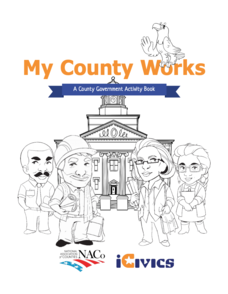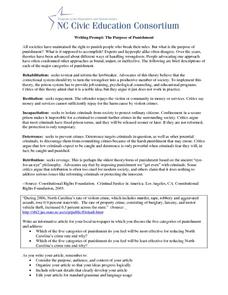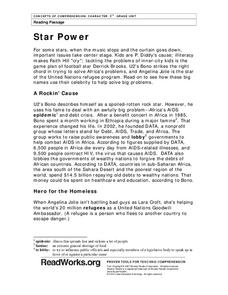Curated OER
Forms of Government Project
From the United Kingdom's constitutional monarchy to the dictatorship of North Korea, this is a very simple project that will help your class members gain a better understanding of different forms of government that exist around the...
PBS
Reading Adventure Pack: Government
A reading adventure pack looks closely at government with the help of two books—one fiction, one nonfiction, and a series of activities. Learners craft a mobile to visualize a balanced government, participate in a scavenger hunt around...
iCivics
Limiting Government
While this instructional activity includes several nice worksheets to identify and discuss the various limits on government (i.e. a constitution, the rule of law, separation of powers, consent of the governed, etc.), its main value lies...
iCivics
Power Play
Should states or the federal government have more power? With this fantastic online interactive, your pupils will be charged with the task of identifying arguments that support either federal or state power.
Judicial Learning Center
Types of Court Cases
How can one court acquit someone of a crime, while another convicts the person of the same one? It's all because of the differences between civil and criminal trials. An informative resource provides scholars in the field of criminology...
Los Angeles Unified School District
Capitalism and Socialism
Capitalism, socialism, communism ... these may seem like a whole bunch of isms to your scholars. High schoolers won't confuse them after completing an informative resource. Your class masters how to use primary sources to critically...
New York State Education Department
US History and Government Examination: August 2016
Multiple-choice and essay questions test comprehension, writing ability, and skills with primary source analysis. The comprehensive exam covers many different subjects including the United States census, Constitution, and important...
iCivics
Why Government?
Why do people create governments? Where did we get our ideas about government? This is a fantastic introductory instructional activity for your American government class that begins by reviewing the philosophies of Thomas Hobbes and John...
Curated OER
Lesson 4: The Judiciary: A Brief Introduction to the Courts System
Focusing on the judicial branch of government, the fourth lesson in this series explores the structure of the US courts system. Beginning with an engaging activity based on the short story The Lady or the Tiger, students go on to examine...
American Constitution Society
Constitution in the Classroom: The Right to Vote
The system of checks and balances is integral to the functionality of the United States government. Learn more about the ways the three branches of the government work together—and about the limitations of their power—with an informative...
San Antonio Independent School District
Colonies in the Americas
Compare and contrast the goals, types of government, interactions with Native Americans, and other important features of the Spanish, British, and French colonies in the Americas with this graphic organizer.
iCivics
My County Works
A 22-page packet sheds light on the hard work taking place at a county's seat. Scholars read brief informational text and fill in information about their own county workers. Pages take you to a department around the county site each...
Judicial Learning Center
State Courts vs. Federal Courts
Popular culture often portrays the Feds as the most fearsome of law enforcement agencies. Yet, someone charged with a crime is considerably more likely to end up in a state court. The lesson, one of six covering the Organization of the...
Judicial Learning Center
The Appeal Process
Why doesn't the Supreme Court hear testimony from witnesses? How do they complete an entire proceeding in less than two hours? A helpful lesson guides scholars of criminology through these and other questions by explaining how appeals...
Federal Reserve Bank
“W” Is for Wages, W-4 and W-2
Don't let your young adults get lost in the alphabet soup of their paychecks and federal income taxes. Using sample pay stubs and reproductions of government forms, your class members will identify the purpose of such forms as a W-4 and...
Carolina K-12
Writing Prompt: The Purpose of Punishment
When punishment is given in a society when a member breaks its rules, what is it meant to accomplish? After summarizing the significant categories of punishment (rehabilitation, restitution, incapacitation, deterrence, and retribution),...
Utah State Courts
Judges in the Classroom
Class members explore the process of a disposition hearing for juveniles, particularly looking at how the judge decides what sentence the juvenile offender should receive. Task your pupils with evaluating different sample cases provided...
Read Theory
Analogies 2 (Level 7)
Determining the relationships between words is the purpose of this analogy worksheet. Learners puzzle through 10 different analogies by using bridge sentences and types to determine which pairs of words share the same relationships.
Reading Through History
Anti-Federalist Paper No. 3
Who were the Anti-Federalists and what do primary sources tell young historians about their beliefs? Learners read Paper No. 3 to understand their values in relation to government, such as their discussion on foreign policy and the pros...
San Antonio Independent School District
Ancient Civilizations
Here is a fantastic set of graphic organizers to accompany your study of civilizations such as ancient Egypt, Sumer, Assyria, and Persia.
Federal Reserve Bank
FRED in the Classroom: Debt and Deficit
Here is a hands-on activity where your class members will discover different ways to measure the government's financial situation and work to add data and redraw graphs in order to calculate the ratio of gross federal debt held by the...
K12 Reader
What Glaciers Leave Behind
Glaciers may seem distant and stationary, but they are huge deposits of moving ice that have made changes to the earth's surface. Your pupils can learn about the different types of impressions left by glaciers by reading the short...
Read Works
Star Power
Angelina Jolie, Bono, and P. Diddy all have something in common: they use their fame to contribute to society in such a way that makes the world a better place. After reading a three-page passage on the types of causes to...
Anchorage School District
Hints for Writing a Conclusion
Writing the conclusion of an essay can often seem like a superfluous or daunting task. Support your young writers in understanding the various types and purposes of a conclusion paragraph, such as summarizing key points of a paper or...
Other popular searches
- Compare Types of Governments
- 3 Types of Government
- Three Types of Government
- Five Types of Government
- Types of Government Diagram
- World Types of Government
- Government Types
- Government Types Lesson Plans
- World Government Types
- Types of Government Systems
- Different Types of Governments
- Greece Types of Governments

























